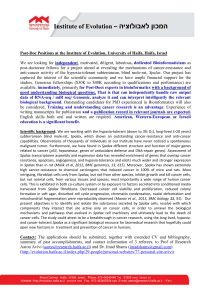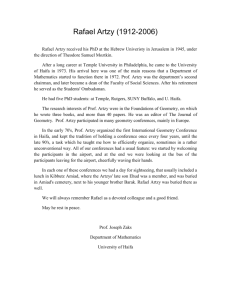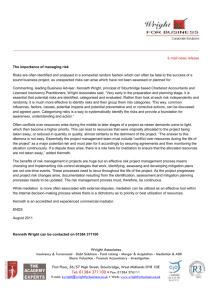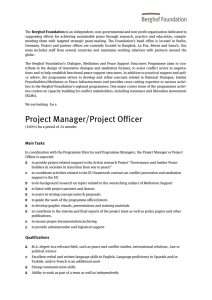הפיח תטיסרבינוא
advertisement
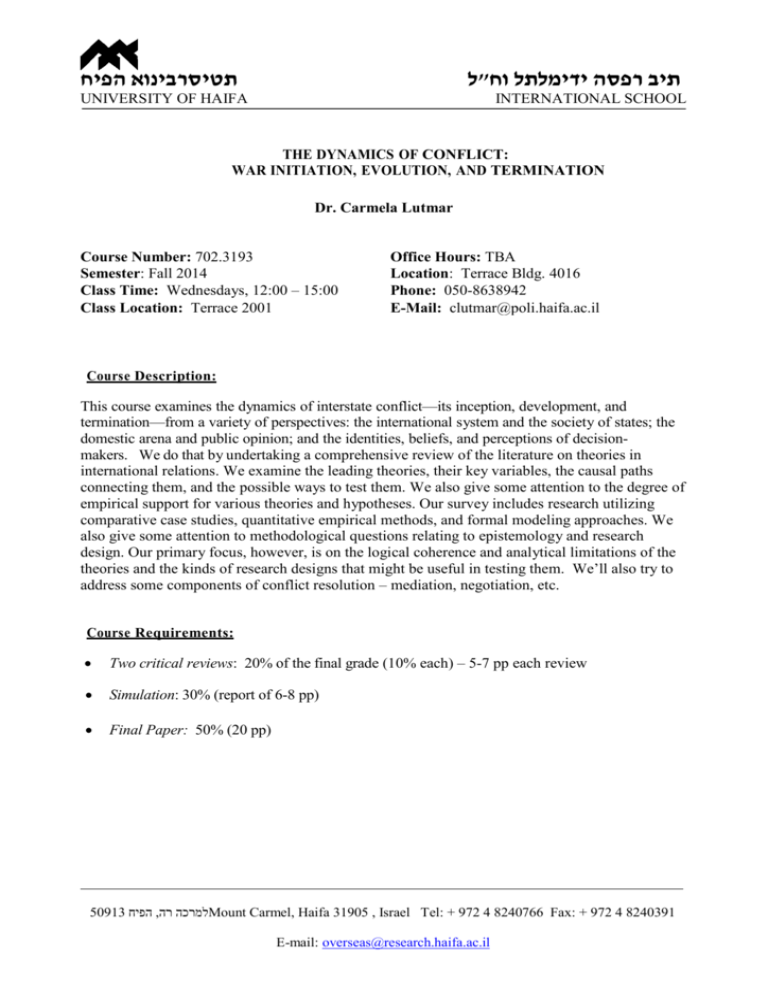
תטיסרבינוא הפיח תיב רפסה ידימלתל וח"ל UNIVERSITY OF HAIFA INTERNATIONAL SCHOOL THE DYNAMICS OF CONFLICT: WAR INITIATION, EVOLUTION, AND TERMINATION Dr. Carmela Lutmar Course Number: 702.3193 Semester: Fall 2014 Class Time: Wednesdays, 12:00 – 15:00 Class Location: Terrace 2001 Office Hours: TBA Location: Terrace Bldg. 4016 Phone: 050-8638942 E-Mail: clutmar@poli.haifa.ac.il Course Description: This course examines the dynamics of interstate conflict—its inception, development, and termination—from a variety of perspectives: the international system and the society of states; the domestic arena and public opinion; and the identities, beliefs, and perceptions of decisionmakers. We do that by undertaking a comprehensive review of the literature on theories in international relations. We examine the leading theories, their key variables, the causal paths connecting them, and the possible ways to test them. We also give some attention to the degree of empirical support for various theories and hypotheses. Our survey includes research utilizing comparative case studies, quantitative empirical methods, and formal modeling approaches. We also give some attention to methodological questions relating to epistemology and research design. Our primary focus, however, is on the logical coherence and analytical limitations of the theories and the kinds of research designs that might be useful in testing them. We’ll also try to address some components of conflict resolution – mediation, negotiation, etc. Course Requirements: Two critical reviews: 20% of the final grade (10% each) – 5-7 pp each review Simulation: 30% (report of 6-8 pp) Final Paper: 50% (20 pp) 50913 הפיח,למרכה רהMount Carmel, Haifa 31905 , Israel Tel: + 972 4 8240766 Fax: + 972 4 8240391 E-mail: overseas@research.haifa.ac.il תטיסרבינוא הפיח תיב רפסה ידימלתל וח"ל UNIVERSITY OF HAIFA INTERNATIONAL SCHOOL Course Outline and Reading List 1. Realism, Neorealism: anarchy, security dilemma theory (the spiral model), Prisoner’s Dilemma, Liberalism, Neoliberalism and International Institutions ―Symposium: The Realist Paradigm and Degenerative versus Progressive Research Program.‖ Responses from Waltz, Walt, Elman, Schweller, Christensen. 1997. APSR 91(4): 899-936 Jervis, Robert. 1998. ―Realism in the Study of World Politics. IO 52(4): 971-91. Kenneth N. Waltz. 1989. "The Origins of War in Neorealist Theory." Journal of Interdisciplinary History 18(4): 615-28. Martin, Lisa L. and Beth A. Simmons. 1998. ―Theories and Empirical Studies of International Institutions.‖ International Organization 52(4): 729-757 Jervis, Robert. 1999. ―Realism, Neoliberalism, and Cooperation: Understanding the Debate. IS 24(1): 42-63 Recommended Readings Morgenthau, Hans J. 1985. (Revised Kenneth W. Thompson). Politics Among Nations: The Struggle for Power and Peace NY: McGraw-Hill. Chapters 1-3, 8-10, 11-14 (First published in 1948) Thucydides. The Peloponnesian Wars (Modern Library College Edition) Book I, all; Book II, 1-65; Book III, 36-84; Book V, 84-115; Book VII, 42-87 Doyle, Michael. 1996. Ways of War and Peace: Realism, Liberalism, and Socialism NY: W.W. Norton, Part One, pp. 41-204 Waltz, Kenneth N. 1959. Man, the State, and War NY: Columbia UP, especially chapters 6–7, pp. 159-223 Wolfers, Arnold. 1962. Discord and Collaboration: Essays on International Politics Baltimore: Johns Hopkins UP. Chapters 4, 6, 7, 8, 10 Keohane, Robert O. 1986. Neorealism and Its Critics NY: Columbia UP. Chapters 1-7 (1-203), and chapters 9-11 (255-346). Waltz, Kenneth N. 1979. Theory of International Politics NY: McGraw-Hill. Read All Waltz, Kenneth N. 1990. ―Realist Thought and Neorealist Theory.‖ Journal of International Affairs 44(1): 21-37 Gilpin, Robert. 1981. War and Change in World Politics NY: Cambridge UP. Chs. 2-5 Symposium: The Realist Paradigm and Degenerative versus Progressive Research Program.‖ Responses from Waltz, Walt, Elman, Schweller, Christensen. 1997. APSR 91(4): 899-936 Powell, Robert. 1994. The Neorealist-Neoliberal Debate.‖ IO 48(2): 313-40 Schweller, Randall and David Priess. 1997. ―A Tale of two Realisms: The Institutions Debate.‖ Mershon International Studies Review 41(1): 1-32 Moravcsik, Andrew. 1997. ―Taking Preferences Seriously: A Positive Liberal Theory of International Politics.‖ IO 51(4): 513-53 50913 הפיח,למרכה רהMount Carmel, Haifa 31905 , Israel Tel: + 972 4 8240766 Fax: + 972 4 8240391 E-mail: overseas@research.haifa.ac.il תטיסרבינוא הפיח תיב רפסה ידימלתל וח"ל UNIVERSITY OF HAIFA INTERNATIONAL SCHOOL Goldstein, Judith, Robert Keohane, and Anne-Marie Slaughter. 2000. ―Introduction: Legalization and World Politics.‖ IO 54(3): 385-399 2. Culture in International Relations + Criticizing the “Isms”….. Michael C. Desch. 1998. "Culture Clash: Assessing the Importance of Ideas in Security Studies." International Security, 23(1): 141-70. Alastair Iain Johnston, 1995. "Thinking about Strategic Culture." International Security 19(4): 32-64 Bercovitch, Jacob and Elgstrom O. 2001. Culture and International Mediation: Exploring Theoretical and Empirical Linkages, International Negotiation 6(1): pp. 3-23. 3. Leaders – Good Dictators vs Bad Dictators Hermann, Margaret G. 1980 ― Explaining Foreign Policy Behavior Using the Personal Characteristics of Political Leaders. ISQ 24(1): 7-46 The Dictator’s Handbook: why Bad Behavior is Almost Always Good Politics 2012. Bruce Bueno de Mesquita and Alastair Smith. Public Affairs Publishers Chan, Steve. 1997. ―In Search of Democratic Peace: Problems and Promise Mershon International Studies Review, 41(1): 59-91. Movie – 12 Angry Men Recommended Readings Maoz, Zeev and Bruce Russett. 1993. Normative and Structural Causes of Democratic Peace. APSR, 87(3): 624-38 Bueno de Mesquita, Bruce, James D. Morrow, Randolph M. Siverson, and Alastair Smith. 1999. ―An Institutional Explanation of the Democratic Peace. APSR, 93(4): 791-807 4. Foreign Policy Analysis & Allison’s Models + Humanitarian Intervention Chapters from Allison and Zelikow’s book. Bender, Jonathan and Thomas H. Hammond. 1992 ― Rethinking Allison’s Models. 86(3): 301-22 5. Rising Tensions with Iran + Nukes Kenneth N. Waltz, "Nuclear Myths and Political Realities." American Political Science Review 84, 3 (September 1990): 731-45. John Mueller, "The Essential Irrelevance of Nuclear Weapons," International Security 13 (Fall 1988): 55-79 Paul K. Huth, "The Extended Deterrent Value of Nuclear Weapons." Journal of Conflict Resolution 34 (June 1990): 270-90. Carl Kaysen. "Is War Obsolete? A Review Essay." International Security, 14 (Spring 1990): 42-64. 50913 הפיח,למרכה רהMount Carmel, Haifa 31905 , Israel Tel: + 972 4 8240766 Fax: + 972 4 8240391 E-mail: overseas@research.haifa.ac.il תטיסרבינוא הפיח תיב רפסה ידימלתל וח"ל UNIVERSITY OF HAIFA INTERNATIONAL SCHOOL Scott D. Sagan and Kenneth N. Waltz, The Spread of Nuclear Weapons: A Debate Renewed. New York: W.W. Norton, 2002. 6. Conditions for mediation success Case: Camp David accords Questions to think about: What constitutes mediation success? Was Camp David a success? What about Haig’s mediation activities over the Falkland-Malvinas islands? What accounts for the lack of successful mediation in Cyprus? What unanswered questions about mediation do these examples raise for you? William Quandt, 1986, “Camp David and Peacemaking in the Middle East”, Political Science Quarterly 101(3): 357-77 Shibley Telhami, 1999, “From Camp David to Wye: Changing Assumptions in Arab-Israeli Negotiations”, Middle East Journal 53(3): 379-92 7. Mediated national integration after protracted civil conflict Questions to think about: Who were the main conflicting parties? When did the conflict begin? What major issues were at stake? When did the mediation occur? Who were the principle mediators? What form(s) did the mediation activity take? Were there any key turning points in the mediation process? Was the mediation “successful”? By what criteria? How do various authors explain the success or failure of the mediation activities? What role, if any, did international law play? What role, if any, did mediation play in the implementation of the mediated agreement? What hypotheses about mediation does this case suggest? Are there any general lessons or insights you can gain from this case? Case: Cyprus Sisk, T. D. (2002). Power sharing and international mediation in ethnic conflict (ch.3: Democracy and its alternatives in deeply divided societies). Washington, DC: U.S. Institute of Peace Press. Ker-Lindsay, James. 2011. The Cyprus Problem: What Everyone Needs to Know. UK: Oxford UP 8. When to Mediate? Waiting for the parties to ask for mediation or actively seeking their consent. Preventive Diplomacy and its application. The ripeness factor. Windows of opportunity. Zartman, I. William 2001. The Timing of Peace Initiatives: Hurting Stalemates and Ripe Moments, The Global Review of Ethnopolitics 1(1): 8-18. Kleiboer, Marieke 1994. Review: Ripeness of Conflict: A Fruitful Notion?, Journal of Peace Research 31(1): pp. 109-116 . 50913 הפיח,למרכה רהMount Carmel, Haifa 31905 , Israel Tel: + 972 4 8240766 Fax: + 972 4 8240391 E-mail: overseas@research.haifa.ac.il תטיסרבינוא הפיח תיב רפסה ידימלתל וח"ל UNIVERSITY OF HAIFA INTERNATIONAL SCHOOL 9. Deadlocks in International Negotiation + Negotiations with Terrorists Readings – Chapter 8, Introduction and Conclusion from Amrita Narlikar (ed), 2010, Deadlocks in Multilateral Negotiations: Causes and Consequences, Cambridge UP Reading chapters from Zartman + Faure (eds), 2011, Engaging Extremists: Trade Offs, Timing, and Diplomacy USIP Press 10. South China Sea (Power Transition Theory) + Interstate War with Iraq (Regime Change and Sanctions) Jack S. Levy, “Power Transition Theory and the Rise of China.” In Robert S. Ross and Zhu Feng, eds., China's Ascent: Power, Security, and the Future of International Politics. Ithaca, New York: Cornell University Press, 2008. Pp. 11-33. Jacek Kugler and Douglas Lemke, "The Power Transition Research Program: Assessing Theoretical and Empirical Advances." In Manus I. Midlarsky, ed., The Handbook of War Studies II. Ann Arbor, MI: University of Michigan Press, 2000. Pp. 129-63. Jon M. DiCicco and Jack S. Levy, "Power Shifts and Problem Shifts: The Evolution of the Power Transition Research Program." Journal of Conflict Resolution 42,4 (December 1999): 675-704. Richard Ned Lebow and Benjamin Valentino, "Lost in Transition: A Critical Analysis of Power Transition Theory. International Relations 23, 3 (2009): 389-410. 11 + 12 Simulation 50913 הפיח,למרכה רהMount Carmel, Haifa 31905 , Israel Tel: + 972 4 8240766 Fax: + 972 4 8240391 E-mail: overseas@research.haifa.ac.il תטיסרבינוא הפיח תיב רפסה ידימלתל וח"ל UNIVERSITY OF HAIFA INTERNATIONAL SCHOOL 50913 הפיח,למרכה רהMount Carmel, Haifa 31905 , Israel Tel: + 972 4 8240766 Fax: + 972 4 8240391 E-mail: overseas@research.haifa.ac.il

